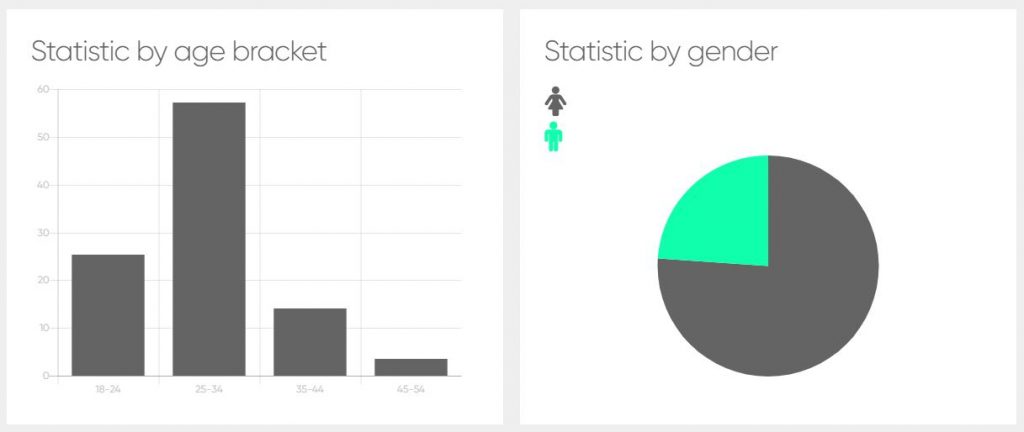
LELO wouldn’t be able to make great sex toys if it weren’t for the information and feedback from our customers’ pleasure, which is why we recently launched an Orgasm Quiz so we could better understand what gets you off. We’re dedicating National Orgasm Day to bridging the orgasm gap , and the first step to doing so is understanding the differences in our physiological and sexual habits.

First things first—who’s taking our survey?

Unsurprisingly, our survey is being filled out by over 75% females and less than 25% males. Overall, age range 25-34 is most actively taking the quiz (57.1%), followed by 18-24 (25.3%), 35-44 (14%) and so forth. We say unsurprisingly because this quiz has thus far only been promoted through social media, and our social media following is predominantly women. Interestingly enough, however, our purchasing behavior is split pretty evenly. So is our blog readership, so we’re curious to see how this data changes with your help.
It’s also pretty neat to see how far our quiz has reached. Of course, English speaking countries (the U.S., Canada, U.K. and Australia) are dominating, but we’ve also had submissions from Finland, Uzbekistan, Georgia and Kenya. Point in case—masturbation is a natural (and healthy) tendency of the human race, regardless of where you come from.

Now let’s get to the juicer stuff. How are people orgasming?
When it comes to our respondents’ first orgasms, 80% experienced them through masturbation and almost 20% through partnered sex. When it comes to masturbation, clitoral stimulation takes the cake by a landslide (45%), and in second place is combination stimulation through clitoral and vaginal or anal (27%). That means that a whopping 60% of people are cumming via some form of clitoral stimulation. Unfortunately, the current sexual narrative focuses only on penetrative stimulation (which can still be amazing), so we need to start talking about pleasure in a more holistic sense.
And if our partners aren’t willing to get cliterate , it’s time to take pleasure into our own hands because it is Orgasm Month after all. Sexual wellness is part of our overall health, and with all the benefits that sex , masturbation and orgasms bring, the reason why LELO makes quality pleasure makers is a given. It’s the ultimate act of self-love.
Ever heard of the quote “ask and you shall receive?” Of course you have, but when it comes to discussing sexual preferences with a partner, 15% of respondents have never done it. This is predominantly because they feel embarrassed or because their partners aren’t open to this kind of conversation. Communication should be used as a tool for better sex, and these conversations should start outside of the bedroom so that you’re not pressured in the heat of the moment. Make sure you’re speaking the same love language, reminisce on the great sex you’ve had together, and normalize communication as part of your romantic relationship, FWB or whatever it may be.
Have you faked it?
Believe it or not (believe it—we have the data), 67% of respondents have faked an orgasm. Of those who have faked it, 27% report faking it “almost never” while 26% report faking it “sometimes”. It makes sense that faking orgasms it detrimental to any long-term relationship because you’re encouraging our partner to continue when they could be making changes that would enhance the experience for both of you.
There are three primary reasons why we fake orgasms ; 1. We want our partners to feel successful, 2. We want to end it because we’re tired or bored, and 3. We don’t want to make our partners feel bad because we like them. The team that conducted this research chalks up the underlying reason to why we fake it as, once again, a lack of communication. Another interesting finding is that women who felt more comfortable using the word “clitoris ” had higher overall sexual satisfaction. So say it with us now—CLITORIS, CLITORIS, CLITORIS. See, it’s getting better already.
Have you admitted that you’ve faked it?
When it comes to telling our partners we’ve faked an orgasm, only 25% have, but when it comes to telling our friends that we’ve faked it, 67% of us have. The moral of the story here is to keep your friends close, and talking about your preferred sexual preferences with your partner closer.
A majority of participants (60%) also admitted to feeling pressure to climax quickly when their partner’s attention was focused solely on their pleasure. As much as we encourage you to show your partner what you like, it’s not all about you. Reciprocate! Knowing what each other like means better sex and more orgasms for everyone.
The post LELO Orgasm Quiz Insights: What’s Making Us All Come? appeared first on Volonté .
Intimate Tickles found this article quite interested, and we thought you might to. We give all the credit for this article to Donna Turner. Click Here To Read This Article From It's Original Source